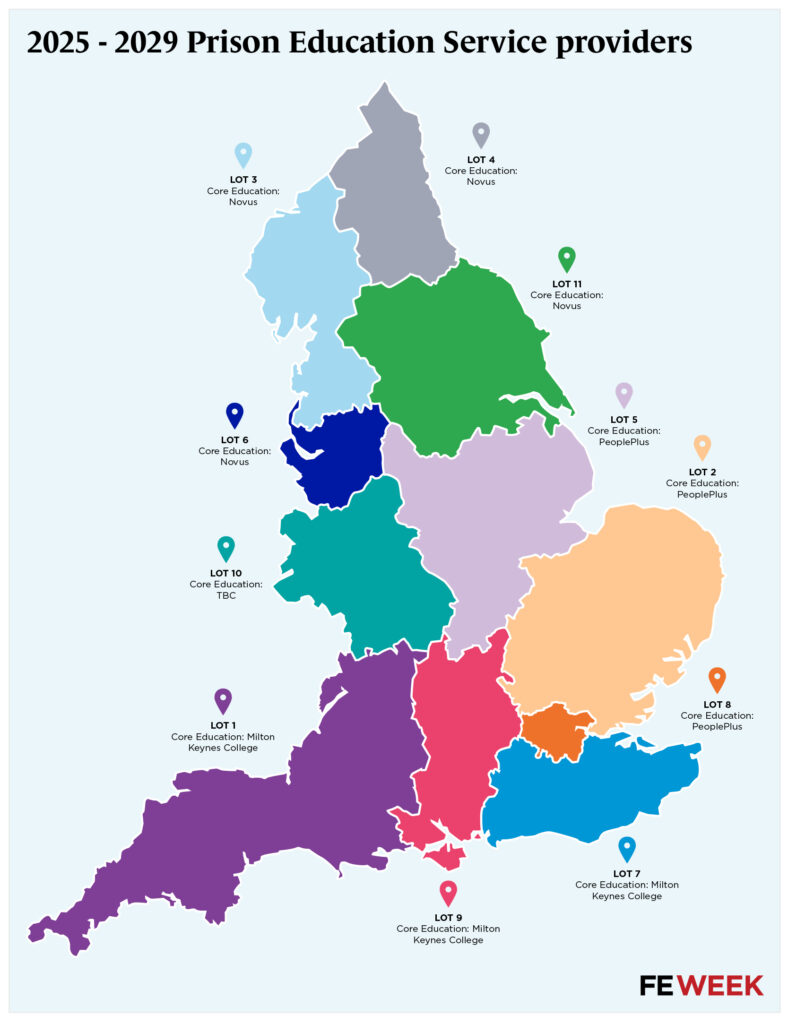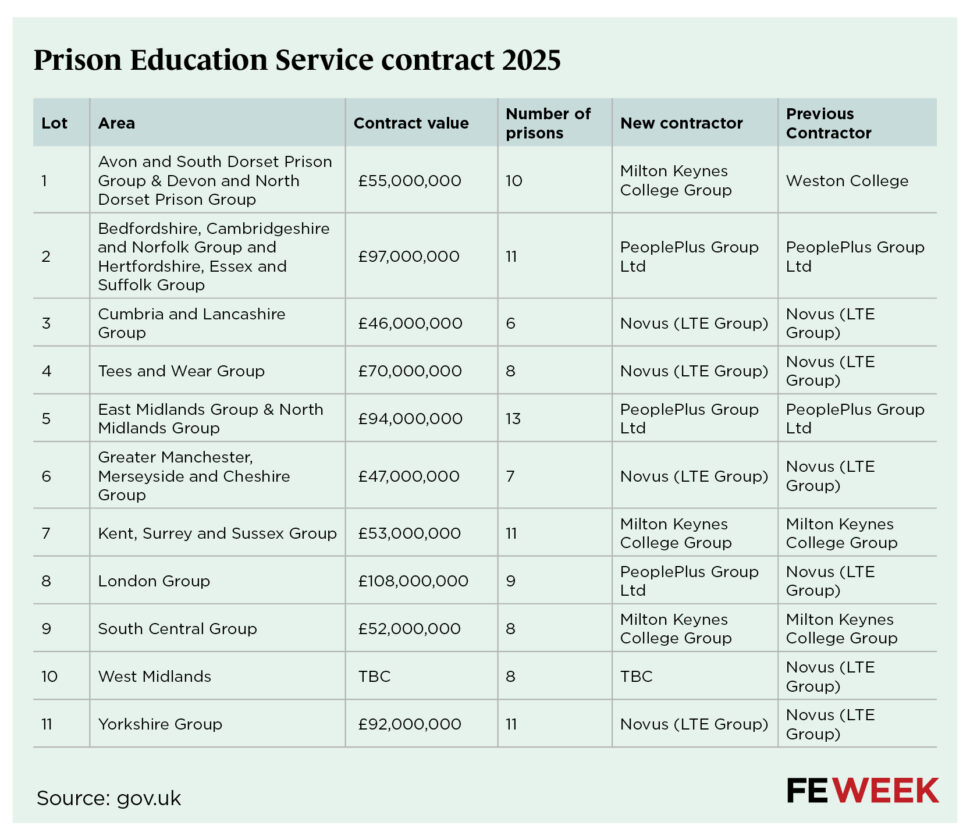Contracts worth up to £1.5 billion to “overhaul” heavily criticised education and training in England’s prisons have been awarded to three existing providers after a two-year procurement.
Milton Keynes College, People Plus and Novus, which is part of Manchester-based college group LTE Group, have been confirmed as the chosen providers of the new Prison Education Service (PES) from October this year.
It means education in just 26 out of England’s 102 prisons will change hands.
Launched in 2023, the PES promised tougher targets and greater focus on English and maths training and employment outcomes in a bid to boost rehabilitation and cut crime.
Winners were supposed to be announced earlier this year, with the contracts starting in April, but the MoJ delayed to “allow more time for contract award and mobilisation”.
The PES providers are all existing prison education contractors, a system which HM chief inspector of prisons called “generally poor” in his 2024-25 annual report, citing 75 per cent of Ofsted inspections into prison education provision resulted in ‘inadequate’ or ‘requires improvement’ judgments.
MPs and experts have warned that the long-awaited procurement results risk more of the same poor outcomes for prisoners, with some calling for DfE to take over the contracts from the Ministry of Justice (MoJ).
New contracts
Each PES provider has been awarded several contracts to run provision across regional lots for an initial period up to October 2029, with a possible further extension up to 2032.
Despite the two-year procurement process, the MoJ failed to award a contract covering eight prisons in the West Midlands due to “exceptionally close scoring” between bidders. Existing contract-holder Novus has been granted a six-month extension while a retender takes place.
London was the one of two regional lots to see the prison education provider change hands. The £108 million contract went to PeoplePlus, who will take over from Novus.
Meanwhile, Milton Keynes College will take over nine prisons in the South West from Weston College, which did not bid for any PES contracts. The new £55 million contract, lot 1 in the table below, includes one high-security prison, HMP Erlestoke, which was already part of Milton Keynes College’s roster.
People Plus’s three contracts combined are worth up to £299 million for the training company. Novus secured four contracts worth up to £255 million, while Milton Keynes College Group’s three contracts are worth up to £160 million.

Unlike the previous prison education framework, womens prisons and long-term high-security provisions are included within the regional lots, rather than education being provided by a single national provider.
The revamped contract would also appoint a head of education in each prison as well as skills and work managers and neurodiversity support managers.
Ministers have said the renewed prison education service aims to “strengthen the quality of delivery” and drive a focus on learner outcomes and collaboration between prisons and education providers.
Providers will be measured against key performance indicators covering English, maths and reading, accredited study programmes, non-accredited study programmes and additional learning needs.
A People Plus spokesperson said: “We are very pleased to have further extended our prison education service delivery through the East of England and East/North Midlands and now across London.”
Meanwhile, Milton Keynes College won three lots, comprising no change from its current provision of 29 state prisons as well as the privately-run Fosse Way prison in Leicestershire.
“This announcement represents a significant vote of confidence in the work of our prison education services teams and we’re enormously proud of them and the work they do,” said CEO and Principal of MK College Group, Sally Alexander.
A fresh start, or more of the same?
The University and College Union (UCU) prisons official, Paul Bridge said: “PES and its predecessor PEF have not enabled the prison education ‘market’ to expand. In fact, the reverse is the case.”
Bridge added that prison education should sit within the Department for Education, not MOJ.
“Until it does, nothing will fundamentally change,” he told FE Week.
Meanwhile, Jon Collins, chief executive of the Prisoner Education Trust warned: “While there are no new education providers – the three organisations appointed to manage the new contracts are all current providers – it is essential that what we get isn’t just more of the same.”
MPs are also not convinced the new contract will offer up meaningful rehabilitation.
Last month, Labour MP Kim Johnson grilled the government on how it was rectifying the 82 per cent of prisons and young offender institutions rated ‘requires improvement’ or ‘inadequate’ by Ofsted.
“Yet, the Prison Education Service still outsource the same poorly performing contracts to poorly performing providers,” she said at justice questions in the House of Commons.
“Everyone accepts that prison education is not currently good enough and these new contracts should be a chance for a fresh start,” Collins added.
A Prison Service spokesperson said: “We’re overhauling prison education to give offenders the skills they need to turn their lives around and help cut reoffending.
“Alongside these new core contracts, we have invested in staff, digital tools and wider education services, to improve access to learning and drive better outcomes.”

Public pension protection
The MoJ has dragged its feet since the PES tender was launched as to whether the guarantee that staff delivering publicly funded services will have access to public pensions – also known as the New Fair Deal.
The Treasury confirmed last year that FE college staff transferred to private companies delivering public services will have access to generous public pensions, namely the Teacher Pension Scheme and the Local Government Pension Scheme.
Bridge told FE Week that UCU had been writing to the MoJ for confirmation that this would apply to prison educators for over one year.
He claimed bidders were asked to submit two costings as part of their bid; one applying the TPS and LGPS costs and one without.
But until last week, the MoJ refused to confirm that the New Fair Deal will apply to prison educators who are TUPE’d over to private providers.
Justice minister Sir Nic Dakin confirmed the MoJ would work with suppliers who need to apply for “admitted body status” to access public pension schemes.
However, he added in another PQ that the MoJ has “not made any such assurances” if private providers are unsuccessful in their application.
Bridge said this leaves the pension guarantee open to interpretation and leaves hundreds of workers at People Plus in pensions limbo until October.
“It’s not been confirmed that People Plus has secured admitted body status into the TPS or LGPS,” he said.
He added: “If admitted body status isn’t secured or a scheme of broad equivalence not set up for hundreds of public sector workers transferring to a private provide under PES, then the MoJ must stand as guarantor to those public sector staff and protect their pensions in this transfer or the minsters words are meaningless and NFD will not apply.”
A People Plus spokesperson added: “In terms of Fair Deal – we see this as an MoJ responsibility to confirm, along with any contract arrangements.”
Novus declined to comment.
















Your thoughts